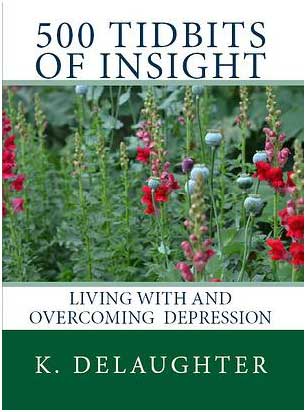Conquering Depression
 Not sure if you are depressed? Read my Eleven Science Based Signs of Depression Below.
Not sure if you are depressed? Read my Eleven Science Based Signs of Depression Below.
Almost 7% of the population suffers from major depressive disorder. No one should have to live with depression or try to fight it alone.
Check out 500 Tidbits of Insight by K. Delaughter
This great book gives practical advice on living with and overcoming depression. 500 Tidbits of Insight is easy to read and is a thorough look at how to realistically improve after developing this major illness. Unfortunately, much of the current philosophy regarding the treatment of depression is rather pessimistic. However, K. Delaughter does a wonderful job of providing hundreds of positive strategies and thought provoking perspectives about how to tackle the beast that is clinical depression.
It is a great read for anyone struggling with this mental illness, but is also beneficial to anyone that is interested in learning more about depression. I am not a paid reviewer and I bought my copy of this book.
For more about 500 Tidbits of Insight see my review below.
Eleven Science Based Signs of Depression:
You may be depressed and not even know it. Here are some proven signs of depression:
1) Do even the smallest decisions feel insurmountable? Depressed people often have difficulty concentrating, maintaining focus, remembering details, and making decisions. Research suggests that depression impairs the ability to take up information and use it (processing speed) (Keilp 2013, Hamilton et al. 2014, Ilamkar 2014).
2) Does the world seem grey and without color? People suffering from depression often say the 'all the color has leached out of the world?' Recent research has found that there is decreased perception of color when people are depressed (Bubl 2014). 
Bubl et al. 2014 used a pattern electroretinogram (PERG) which measures the participant's ability to perceive visual contrast. A PERG measures the eye's electrical change when the retina is stimulated by looking at an object with sharp contrast, like a zebra's stripes. Visual PERGs were done on 80 patients. Twenty of the patients had untreated depression, 20 patients had depression but were on medication, and the remaining 40 patients had no mental health issues. There was a strong and significant association between the severity of the depression and a decreased response in the PERG. Patients that were more depressed had less retina response to the contrast pattern.
3) Have you lost interest in activities or hobbies that you used to enjoy? Depressed people often feel 'bored', cynical or jaded by life (Gupta et al. 2009).
4) Do you feel tired and lethargic all the time? Fatigue and decreased energy often accompany depression (Fava et al. 2014, Mänty et al. 2014, Sánchez-García et al. 2014).
5) Likewise, are your sleep patterns disrupted? People with depression often have insomnia, early-morning wakefulness, or excessive sleeping (Maglione et al. 2012, Lovato N and Gradisar 2014). disrupted sleep may also contribute to fatigue and worsening mood.
6) People with depression may have feelings of guilt, worthlessness, helplessness, hopelessness or pessimism (Sánchez-García et al. 2014). You may feel 'empty' or 'not all there'.
7) Are you sad, irritable, restless, anxious or angry? Do you feel like crying all the time for no reason or do you have suppressed anger? Changes in mood and/or physical activity can be a sign of depression (Burton et al. 2013). Most people know that depression can cause sadness. Recently, psychiatrists have become more aware that people may experience feelings of anger when they are depressed (Sahu et al. 2014).
 8) Are you gaining or losing weight? Overeating or appetite loss can occur along with depression. Ozsoy et al. 2014 found that serum ghrelin concentrations were elevated in depressed people and returned to normal when people were successfully treated for depression. Ghrelin regulates hunger.
8) Are you gaining or losing weight? Overeating or appetite loss can occur along with depression. Ozsoy et al. 2014 found that serum ghrelin concentrations were elevated in depressed people and returned to normal when people were successfully treated for depression. Ghrelin regulates hunger.
9) Are you in chronic pain? Do you have digestive problems? Persistent aches or pains, headaches, cramps, or digestive problems that do not ease even with treatment are associated with depression (Meltzer et al. 2014).
10) Do you have thoughts of suicide or have you had a suicide attempt? Depression is strongly linked with thoughts of suicide (Chesney et al. 2014). If you feel like your life is worthless please get help immediately.
An important note: recent studies suggest that many suicides are a result of a sudden uncontrollable urge. When a popular method of committing suicide is removed often suicide rates decline. For example, states with the highest number of guns per person have a suicide rate twice as high as that of states with the lowest gun ownership (Miller et al. 2007). Suicide barriers on bridges decrease suicides by precisely the number of people that used to jump off that bridge. Over 90% of people prevented from committing suicide go on to live happy productive lives. For an interesting article on this topic see The Urge to End it All by Scott Anderson.
If you or a loved one is feeling suicidal remove all easy ways to commit suicide such as guns or poisons from your home. Please check this link for DBSA, Depression and Bipolar Support Alliance, for more information.
11) Does the world smell a little less sweet? Have you stopped smelling the roses? A recent study found that depressed patients may have a reduced sense of smell (Schablitzky and Pause 2014). People with depression often have changes in brain blood flow and metabolism. This could affect the amygdala which helps regulate smell.
If you feel you are depressed please get help!
Book Review:
500 Tidbits of Insight by K. Delaughter ★ ★ ★ ★ ★ /5
 I have read many books about mental health. Most are long and complex. This book, 500 Tidbits of Insight, is different in a good way. It is written as a series of 500 short snippets of practical advice to help overcome depression. Each tidbit forms a short encapsulated piece of advice for those living with depression.
I have read many books about mental health. Most are long and complex. This book, 500 Tidbits of Insight, is different in a good way. It is written as a series of 500 short snippets of practical advice to help overcome depression. Each tidbit forms a short encapsulated piece of advice for those living with depression.
What I liked about 500 Tidbits of Insight:
You can read this book from start to finish or flip randomly through it.
The advice is practical and very doable.
There are many different subjects and strategies for improving mental health. Even if you don't suffer from depression you will find insight and inspiration in many of the entries.
This book is well written and very straight forward. It makes complex topics easy to read and understand. 500 Tidbits of Insight would be helpful to people who don't have the time, energy or concentration necessary to read a giant massive book on depression.
The author has recovered from depression. She has an extremely empathic and understanding manner. Reading her words is like having a sympathetic but honest friend helping you overcome depression. She is always kind and never condescending.
Difficult topics like suicide and self harm are covered in a sensitive but matter of fact way.
There is no psychobabble in this book. Now sometimes I appreciate a little word play and jargon; as you can tell from some of my more scientific articles on this website. However, it is a refreshing change to read a book about depression that is written in plain English.
Changing your state of mental health means making changes to your basic way of thinking and doing things. The simple but effective ideas in this book support making change in a positive way. Even making a change in how you think can encourage positive mental growth.
I really enjoyed reading 500 Tidbits of Insight. Here is one piece of advice which really resonated with me:
"Your life's most wonderful days probably have not happened yet."
500 Tidbits of Insight is available in kindle or paperback edition.
I believe that mental and physical health are extremely important. In the past I was active with Washington State University Wellbeing (now transiting to Health and Wellbeing); an organization devoted to the eight dimensions of wellbeing; emotional, environmental, financial, intellectual, occupational, physical, social and spiritual. It is up to you to take responsibility for your health and happiness. Not only will you feel better but you will help spread that feeling to others whose lives intersect yours.
References:
- Bubl E, Kern E, Ebert D, Bach M, Tebartz van Elst L. Seeing Gray When Feeling Blue? Depression Can Be Measured in the Eye of the Diseased. Biol. Psychiatry. 2010;68:205-208. Pubmed. doi: 10.1016/j.biopsych.2010.02.009
- Burton C, McKinstry B, Szentagotai Tătar A, Serrano-Blanco A, Pagliari C, Wolters M. Activity monitoring in patients with depression: a systematic review. J Affect Disord. 2013;145:21-8. Pubmed. doi: 10.1016/j.jad.2012.07.001
- Chesney E, Goodwin GM, Fazel S. Risks of all-cause and suicide mortality in mental disorders: a meta-review. World Psychiatry. 2014;13:153-60. Pubmed. doi: 10.1002/wps.20128
- Fava M, Ball S, Nelson JC, Sparks J, Konechnik T, Classi P, Dube S, Thase ME. Clinical relevance of fatigue as a residual symptom in major depressive disorder. Depress Anxiety. 2014;31:250-7. Pubmed. doi: 10.1002/da.22199
- Gupta RK. Major depression: an illness with objective physical signs. World J Biol Psychiatry. 2009;10:196-201. Pubmed. doi: 10.1080/15622970902812072
- Hamilton JL, Brickman AM, Lang R, Byrd GS, Haines JL, Pericak-Vance MA, Manly JJ. Relationship Between Depressive Symptoms and Cognition in Older, Non-demented African Americans. J Int Neuropsychol Soc. 2014;19:1-8. Pubmed.
- Ilamkar KR. Psychomotor Retardation, Attention Deficit and Executive Dysfunctional in Young Non-hospitalised Un-medicated Non-psychotic Unipolar Depression Patients. J Clin Diagn Res. 2014;8:124-6. Pubmed. doi: 10.7860/JCDR/2014/7221.4026 (Full text)
- Keilp JG, Gorlyn M, Russell M, Oquendo MA, Burke AK, Harkavy-Friedman J, Mann JJ. Neuropsychological function and suicidal behavior: attention control, memory and executive dysfunction in suicide attempt. Psychol Med. 2013;43:539-51. Pubmed. doi: 10.1017/S0033291712001419 (Full text)
- Lovato N, Gradisar M. A meta-analysis and model of the relationship between sleep and depression in adolescents: Recommendations for future research and clinical practice. Sleep Med Rev. 2014;pii: S1087-0792(14)00039-2. Pubmed. doi: 10.1016/j.smrv.2014.03.006
- Maglione JE, Ancoli-Israel S, Peters KW, Paudel ML, Yaffe K, Ensrud KE, Stone KL. Depressive symptoms and subjective and objective sleep in community-dwelling older women. J Am Geriatr Soc. 2012;60:635-43. Pubmed. doi: 10.1111/j.1532-5415.2012.03908.x
- Mänty M, Rantanen T, Era P, Avlund K. Fatigue and depressive symptoms in older people. J Appl Gerontol. 2014;33:505-14. Pubmed. doi: 10.1177/0733464812454011
- Miller M, Lippmann SJ, Azrael D, Hemenway D. Household firearm ownership and rates of suicide across the 50 United States. J Trauma. 2007;62:1029-34; discussion 1034-5. Pubmed.
- Meltzer AC, Bregman B, Blanchard J. Depression is Associated with Repeat Emergency Department Visits in Patients with Non-specific Abdominal Pain. West J Emerg Med. 2014 May;15(3):325-8. Pubmed. doi: 10.5811/westjem.2013.7.15635
- Ozsoy S, Besirli A, Abdulrezzak U, Basturk M. Serum ghrelin and leptin levels in patients with depression and the effects of treatment. Psychiatry Investig. 2014;11:167-72. Pubmed. doi: 10.4306/pi.2014.11.2.167
- Sahu A, Gupta P, Chatterjee B. Depression is More Than Just Sadness: A Case of Excessive Anger and Its Management in Depression. Indian J Psychol Med. 2014;36:77-9. Pubmed. doi: 10.4103/0253-7176.127259
- Sánchez-García S, García-Peña C, González-Forteza C, Jiménez-Tapia A, Gallo JJ, Wagner FA. Depressive symptoms among adolescents and older adults in Mexico City. Soc Psychiatry Psychiatr Epidemiol. 2014;49:953-60. Pubmed. doi: 10.1007/s00127-014-0828-x.
- Schablitzky S, Pause BM. Sadness might isolate you in a non-smelling world: olfactory perception and depression. Front Psychol. 2014 Feb 7;5:45. Pubmed. Full text.
